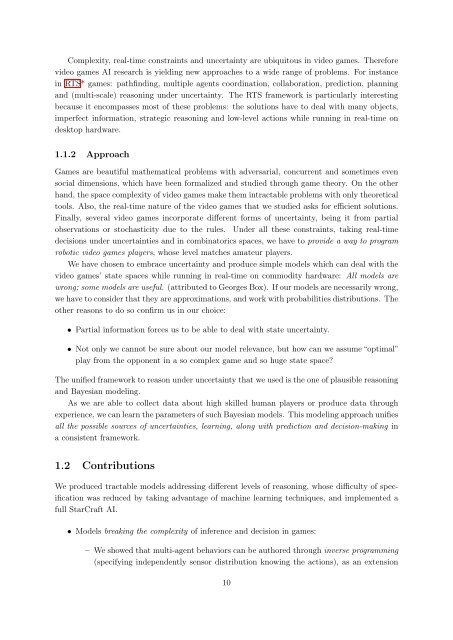Bayesian Programming and Learning for Multi-Player Video Games ...
Bayesian Programming and Learning for Multi-Player Video Games ...
Bayesian Programming and Learning for Multi-Player Video Games ...
You also want an ePaper? Increase the reach of your titles
YUMPU automatically turns print PDFs into web optimized ePapers that Google loves.
Complexity, real-time constraints <strong>and</strong> uncertainty are ubiquitous in video games. There<strong>for</strong>e<br />
video games AI research is yielding new approaches to a wide range of problems. For instance<br />
in RTS* games: pathfinding, multiple agents coordination, collaboration, prediction, planning<br />
<strong>and</strong> (multi-scale) reasoning under uncertainty. The RTS framework is particularly interesting<br />
because it encompasses most of these problems: the solutions have to deal with many objects,<br />
imperfect in<strong>for</strong>mation, strategic reasoning <strong>and</strong> low-level actions while running in real-time on<br />
desktop hardware.<br />
1.1.2 Approach<br />
<strong>Games</strong> are beautiful mathematical problems with adversarial, concurrent <strong>and</strong> sometimes even<br />
social dimensions, which have been <strong>for</strong>malized <strong>and</strong> studied through game theory. On the other<br />
h<strong>and</strong>, the space complexity of video games make them intractable problems with only theoretical<br />
tools. Also, the real-time nature of the video games that we studied asks <strong>for</strong> efficient solutions.<br />
Finally, several video games incorporate different <strong>for</strong>ms of uncertainty, being it from partial<br />
observations or stochasticity due to the rules. Under all these constraints, taking real-time<br />
decisions under uncertainties <strong>and</strong> in combinatorics spaces, we have to provide a way to program<br />
robotic video games players, whose level matches amateur players.<br />
We have chosen to embrace uncertainty <strong>and</strong> produce simple models which can deal with the<br />
video games’ state spaces while running in real-time on commodity hardware: All models are<br />
wrong; some models are useful. (attributed to Georges Box). If our models are necessarily wrong,<br />
we have to consider that they are approximations, <strong>and</strong> work with probabilities distributions. The<br />
other reasons to do so confirm us in our choice:<br />
• Partial in<strong>for</strong>mation <strong>for</strong>ces us to be able to deal with state uncertainty.<br />
• Not only we cannot be sure about our model relevance, but how can we assume “optimal”<br />
play from the opponent in a so complex game <strong>and</strong> so huge state space?<br />
The unified framework to reason under uncertainty that we used is the one of plausible reasoning<br />
<strong>and</strong> <strong>Bayesian</strong> modeling.<br />
As we are able to collect data about high skilled human players or produce data through<br />
experience, we can learn the parameters of such <strong>Bayesian</strong> models. This modeling approach unifies<br />
all the possible sources of uncertainties, learning, along with prediction <strong>and</strong> decision-making in<br />
a consistent framework.<br />
1.2 Contributions<br />
We produced tractable models addressing different levels of reasoning, whose difficulty of specification<br />
was reduced by taking advantage of machine learning techniques, <strong>and</strong> implemented a<br />
full StarCraft AI.<br />
• Models breaking the complexity of inference <strong>and</strong> decision in games:<br />
– We showed that multi-agent behaviors can be authored through inverse programming<br />
(specifying independently sensor distribution knowing the actions), as an extension<br />
10


